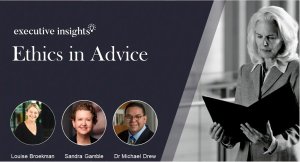
Thought Leadership Articles
Unlocking the Power of Advisory Boards: Why Facilitation Matters More Than Ever
What separates a mediocre advisory board meeting from one that sparks transformative ideas? Effective facilitation.
Thought Leadership Articles
Published 06 December 2023

During a recent executive insights webinar we dived into the topic of “Ethics in Advice” with our Founder Louise Broekman and Certified Chairs™ Sandra Gamble (Chair of the Best Practice and Ethics Advisory Board) and Dr. Michael Drew, FABC (Fellow of the Advisory Board Centre).
Together, they shared their experience in the delivery of ethics in advice and how to navigate the changing landscape, where the consideration of ethical implications and consequences has become more prevalent at the advisory board table.
Below, we summarise the key points from the session and share access to the full recording for those who missed out.
1. Ethics are the ‘core of integrity’. It is important that advisory board members are committed and remind themselves that sometimes there are boundaries that we need to stay within.
2. Advisors should be honest about what they think and honest in the advice they’re providing. It is prudent to ensure there is no agenda other than the objectives of the organisation within the scope of the advisory board.
3. Where advisors may not be providing advice or acting in the best interest of their client, or if there is a situation that arises where a conflict may be perceived, advisors need to be able to step aside in order to avoid a potential conflict of interest and maintain their reputation as an independent advisor.
Dr. Michael Drew lends his expertise to the conversation by stating that the ‘landscape of advice is evolving and changing, leading to a prevailing cynicism directed to those involved in the business of providing advice resulting in a level of distrust in all matters of advice’.
Michael explained that ‘ethics is inescapable’ and where most people tend to run away or side-step ethics, most advisors are beginning to embrace the conversation by running into the teeth of these ethical issues. The sector is growing and there is a deficit in governance systems that requires advisory boards and advisors to step into and become pillars around the ethics of advice.
The ABF101 Best Practice Framework™ is an excellent starting point – underpinned by its three pillars of purpose, process and people. The ABF101 Framework is designed to meet the needs of new and established organisations, reflecting the dynamic and unique nature of individual organisations and the advisory community that supports them.

SET UP AN ADVISORY BOARD
